
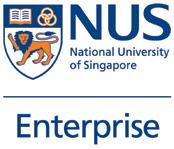
We are happy for you to share or reproduce the content of this publication but do let us know before you do as it is proprietary to NUS Enterprise. Thank you!



We are happy for you to share or reproduce the content of this publication but do let us know before you do as it is proprietary to NUS Enterprise. Thank you!
Dear readers,
The past few months have been filled with excitement for our dynamic community of aspiring entrepreneurs, experienced business leaders, and passionate innovators within the NUS Enterprise community.
One of the main highlights this past quarter has been the meaningful developments unveiled at the recent NUS Deep Tech Venture Showcase, where we announced a S$20 million injection into deep tech innovation and venture creation. These initiatives signify a profound commitment to driving impactful change through entrepreneurship and innovation. The S$10 million Innovation Fellowship and Venture Creation Awards will spur NUS faculty and researchers to adopt an entrepreneurial mindset as they pursue their research, coupled with the enhanced Graduate Research Innovation Programme (GRIP 2.0) where the university has committed S$10 million to provide more pre-seed funding to successful teams, promising to propel the translation of groundbreaking research into tangible solutions. With a focus on fostering an entrepreneurial mindset among faculty and researchers, these initiatives are poised to accelerate the transformation of cutting-edge ideas into real-world applications. Student entrepreneurial activities have been vibrant and diverse, showcasing the innovative spirit and collaborative ethos that define our community. From the inaugural Winter Programme in Entrepreneurship hosted in Bangkok to the groundbreaking Innovation x Impact Immersion Programme (I3P) in Ho Chi Minh City, students have embraced opportunities for cross-cultural learning, handson experiences, and impactful ventures.
In Bangkok, the Winter Programme brought together 100 students from NUS and 13 Thai universities, fostering friendships and collaboration transcending borders. Through intensive workshops, panel discussions, and networking sessions, participants gained valuable insights into Thailand’s start-up ecosystem while honing their entrepreneurial skills.
Meanwhile, in Ho Chi Minh City, the inaugural edition of the Innovation x Impact Immersion Programme (I3P) provided
over 40 student entrepreneurs with a dynamic platform to explore Vietnam’s impact-driven entrepreneurship scene. From engaging sessions with industry experts to handson challenges like the “Make and Market Challenge”, participants immersed themselves in the local ecosystem, gaining invaluable experience and insights.
There is never a shortage of inspiring start-up stories from our ecosystem. We showcase such stories in our Trailblazers section, among these remarkable ventures are KosmodeHealth and Pawsible Foods.
Leveraging cutting-edge plant extraction technology, KosmodeHealth pioneers the repurposing of food processing by-products into valuable sources of plant protein and fibre. Their signature product, W0W noodles, not only addresses nutritional needs but also promotes environmental sustainability by minimising waste. Similarly, Pawsible Foods, is revolutionising pet nutrition through innovative fermentation techniques. By transforming underutilised mushroom stems into nutrient-rich mycoprotein, Pawsible Foods offers sustainable and highquality alternatives to traditional pet food ingredients.
As we reflect on the past few months within our vibrant NUS Enterprise community, it’s evident that innovation and entrepreneurship continue to thrive. Let’s stay committed to excellence and collaboration.

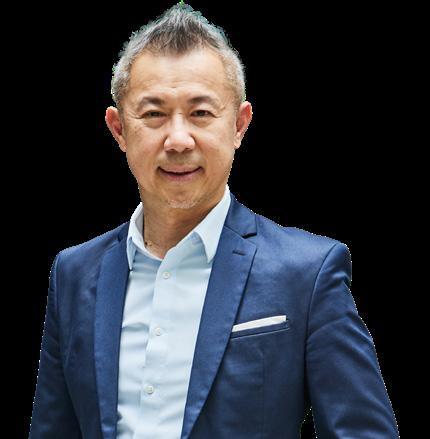 Prof Chen Tsuhan Deputy President (Innovation and Enterprise)
Prof Chen Tsuhan Deputy President (Innovation and Enterprise)

The National University of Singapore (NUS) launched two initiatives at the NUS Deep Tech Venture Showcase on 18 March 2024, to propel deep tech innovation and enhance the entrepreneurial ecosystem at the University. The initiatives include the S$10 million Innovation Fellowship and Venture Creation Awards to boost the translation of cutting-edge research and innovation by NUS faculty and researchers into impactful solutions; and the enhanced Graduate Research Innovation Programme (GRIP 2.0) where the university has committed S$10 million to provide more pre-seed funding to successful teams.
In his welcome remarks, NUS President Professor Tan Eng Chye emphasised the University’s strong commitment to actively addressing some of the world’s

“ This new funding commitment of S$20 million will serve as an impetus for our researchers to be bolder and quicker in exploring and realising the translational potential of their research.
NUS PRESIDENT PROFESSOR TAN ENG CHYE

most pressing challenges from climate change to urbanisation pressures, and the critical need for clean water and sustainable energy solutions, through impactful education, research, and enterprise.
Speaking at the event, Guest-of-Honour Mr Heng Swee Keat, Deputy Prime Minister and Coordinating Minister for Economic Policies, stressed the significance of deep tech in tackling today’s global challenges, as well as the importance of mobilising different players and adopting an intentional and proactive approach to venture building.
Sharing how the new initiatives will build on the innovation and entrepreneurship momentum and align with Singapore’s current Research, Innovation and Entrepreneurship 2025 plan, NUS Deputy President (Innovation and Enterprise), Professor Chen Tsuhan said,
“ Research, Innovation, and Enterprise is an integral part of our mission to foster a dynamic, lifelong learning environment within NUS. We nurture curiosity and the entrepreneurial spirit while providing the support to bring ambitious impactful ideas to life. Through these efforts, we shape the future and contribute to Singapore’s strong position as a leading Global-Asia node for technology, innovation, and enterprise.
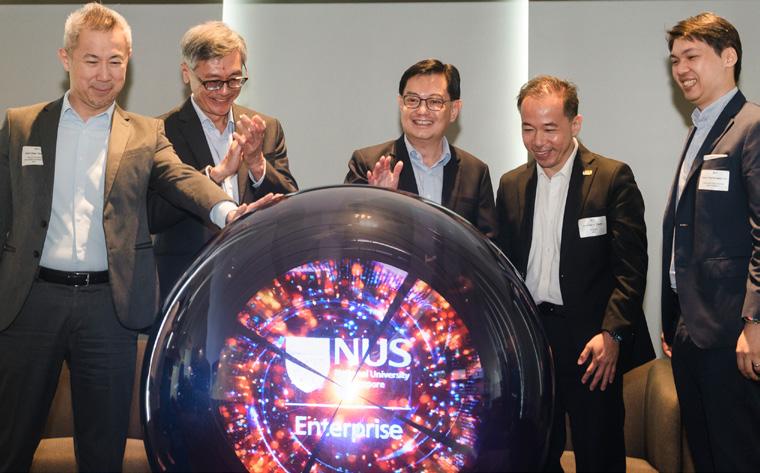

red hot
The Innovation Fellowship and Venture Creation Awards will spur NUS faculty and researchers to adopt an entrepreneurial mindset as they pursue their research. The awards recognise and incentivise these innovators who are at varying stages of their academic careers, to commercialise their research into tangible solutions.
Awardees will receive a two-year grant and guidance from NUS Enterprise to support them in their research commercialisation journey. This initiative aims to enrich the pipeline for new venture creation from Singapore’s deep tech innovations. Successful awardees could be further supported via GRIP in the next phase of their deep tech venture journey.
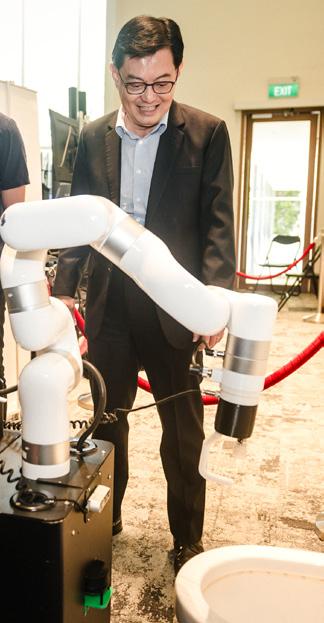 (From left to right) Deputy President (Innovation and Enterprise) Professor Chen Tsuhan, NUS President Professor Tan Eng Chye, Deputy Prime Minister Heng Swee Keat, Deputy President (Academic Affairs) and Provost Professor Aaron Thean, and Associate Vice President (NUS Enterprise) Associate Professor Benjamin Tee, officially launched two initiatives to catalyse innovation and entrepreneurship at NUS.
Deputy Prime Minister Heng Swee Keat receiving a demonstration of the autonomous cleaning robot by Hivebotics.
(From left to right) Deputy President (Innovation and Enterprise) Professor Chen Tsuhan, NUS President Professor Tan Eng Chye, Deputy Prime Minister Heng Swee Keat, Deputy President (Academic Affairs) and Provost Professor Aaron Thean, and Associate Vice President (NUS Enterprise) Associate Professor Benjamin Tee, officially launched two initiatives to catalyse innovation and entrepreneurship at NUS.
Deputy Prime Minister Heng Swee Keat receiving a demonstration of the autonomous cleaning robot by Hivebotics.
Over the past five years, GRIP has nurtured and provided funding support to more than 430 aspiring founders.
Building on the programme’s success, NUS has set aside S$10 million for GRIP 2.0, providing successful teams up to S$250,000 in funding, which is 2.5 times more funding than the initial S$100,000.
As part of GRIP 2.0, NUS Enterprise has also formed strategic partnerships with three leading venture capital firms. This includes Legend Capital, SOSV Investments LLC, and Vertex Holdings, which collectively manage more than US$10 billion in assets. The collaboration with the venture capital firms extends beyond financial support to include coaching for GRIP start-ups and support in increasing their investment readiness, specialised market access and deep industry expertise. Through direct engagement facilitated by GRIP, these venture capital firms will offer practical expertise and networking opportunities, equipping start-ups with tailored guidance to propel them forward in their venture creation journey.
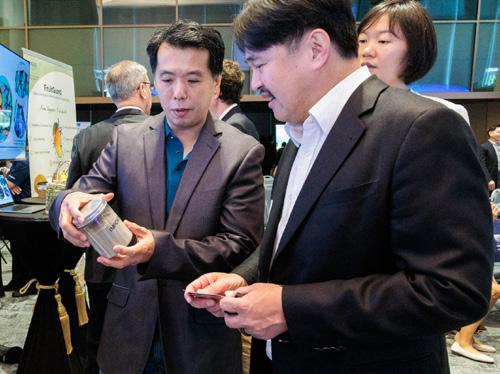


Summing up the benefits and value the newly introduced initiatives bring to our start-ups, faculty, researchers and NUS alumni, NUS Associate Vice President (NUS Enterprise) Associate Professor Benjamin Tee said,
“ At NUS Enterprise, we are uniquely placed to have access to the latest frontier research and breakthroughs at one of the top universities in the region, while providing access to a global start-up ecosystem. The new Innovation Fellowship and Venture Creation Awards and GRIP 2.0 are concerted, complementary efforts to accelerate deep tech innovation and venture creation for maximum impact. These initiatives will provide academics, researchers as well as NUS alumni access to a supportive ecosystem for the greatest chance at success.
At the NUS Deep Tech Venture Showcase, eight deep tech innovations, ranging from autonomous cleaning robots and membrane technology to edible fruit coatings that extend the shelf-life of tropical fruit, also took the spotlight.
The showcase was attended by over 160 guests including NUS start-ups, venture capitalists, government officials and NUS faculty and researchers who had the opportunity to network and interact with the start-ups exhibiting their deep tech ventures.
Associate Professor Pang Sze Dai, CTO, Circrete (left) explains to Dr Wen Hsieh, Founding Managing Partner, Matter Venture Partners, how their green cement revolutionises traditional cement production methods. 2.0: ACCELERATING DEEP TECH INNOVATION THROUGH ENHANCED FUNDING AND SUPPORTThe event’s keynote speaker, Dr Wen Hsieh, Founding Managing Partner, Matter Venture Partners, shared his insights into the intricacies of creating a deep tech start-up ecosystem. He began by defining deep tech and highlighting its distinctive features and possibilities. Dr Wen also elaborated on the importance of leveraging deep tech.
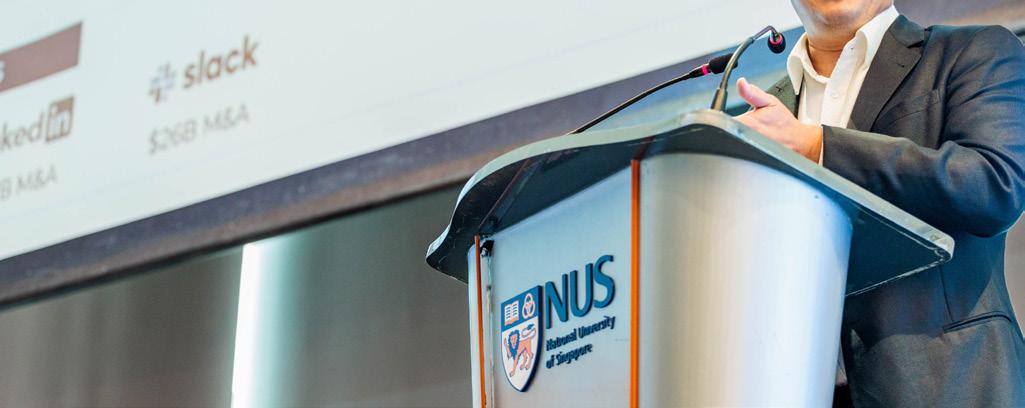
The keynote address was followed by a fireside chat with GRIP alumni and NUS start-up founders on the topic of “Labs to Lives: Pushing the Boundaries, Shaping our Future with Deep Tech Innovations”. The panel, moderated by Mr Sam Tsui, Venture Architect, GRIP, featured Dr Viknish Krishnan-Kutty, CEO and Founder of Cellivate Technologies, Mr Rishab Patwati, CEO and Co-Founder of Hivebotics, and Mr Wan Chunfeng, CEO
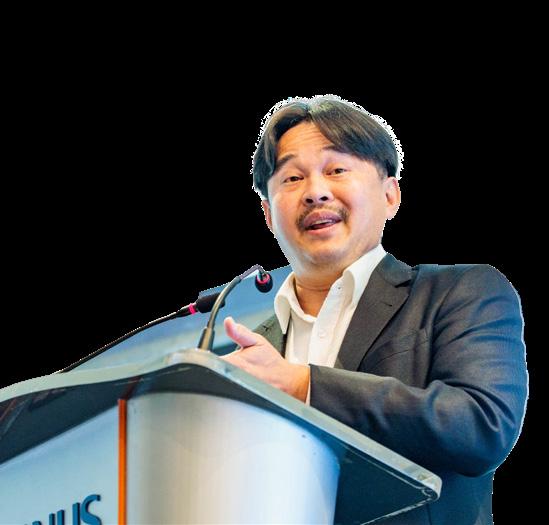

of Solv8. These founders shared their entrepreneurial journeys, illustrating how their deep tech innovations progressed from laboratory prototypes to the creation of real-world practical solutions, making significant impacts across various industries and addressing critical societal challenges to enhance lives. The fireside chat concluded with the start-up founders sharing their plans and highlighting their next entrepreneurial endeavours.
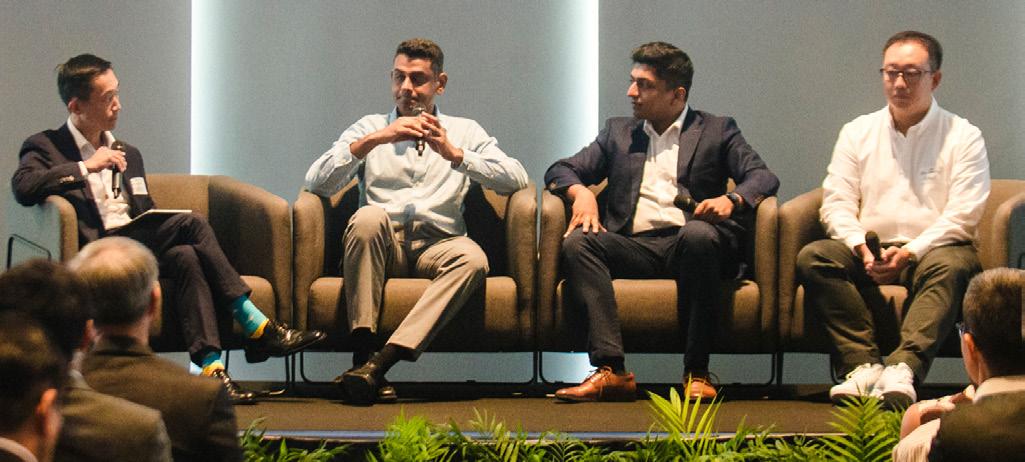 Dr Wen Hsieh, Founding Managing Partner, Matter Venture Partners (right) delivering the keynote speech
A fireside chat with three start-up founders moderated by Mr Sam Tsui, Venture Architect, GRIP.
Dr Wen Hsieh, Founding Managing Partner, Matter Venture Partners (right) delivering the keynote speech
A fireside chat with three start-up founders moderated by Mr Sam Tsui, Venture Architect, GRIP.
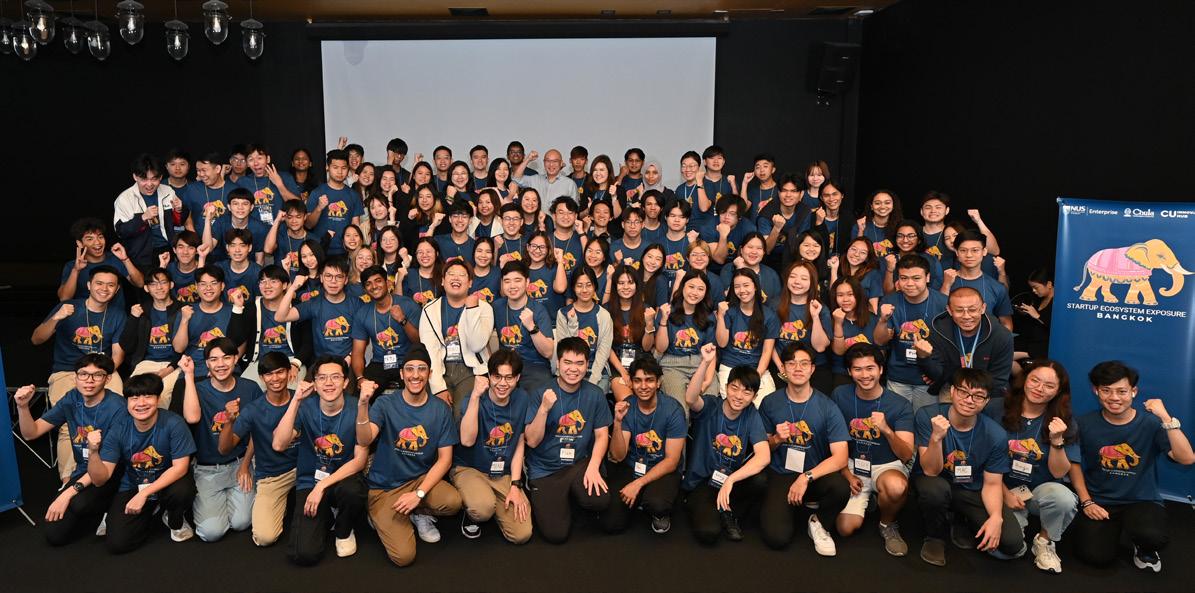
The first NUS Enterprise Winter Programme in Entrepreneurship –Startup Ecosystem Exposure, held from 7 to 14 January 2024 in Bangkok, garnered a cohort of 100 participants comprising 37 students from NUS and 63 students from 13 Thai universities for a one-week exhilarating entrepreneurship boot camp.
In a move toward fostering cross-cultural collaboration and the entrepreneurial spirit, NUS Enterprise partnered Chulalongkorn University to design a boot camp where participants could engage in hands-on activities, develop start-up ideas, refine their entrepreneurship skills and network with like-minded peers within the ASEAN ecosystem.
In his address at the opening ceremony, Professor Chee Yeow Meng, NUS Vice President (Innovation and Enterprise), set out the purpose of the programme, which aims to bring together students from all over the world, particularly in the Southeast Asia region, to equip them with an understanding of each other’s cultures. Through this platform, participants would also be able to “build enduring friendships, through the development of their common interest in innovation and enterprise,” he said.
Professor Kaywalee Chatdarong, Vice President (Strategic Planning, Innovation and Global Engagement), Chulalongkorn University, also encouraged students to have a “collaborative spirit that transcends borders, laying the foundation for future international partnerships and innovative ventures.”
The highlight of the boot camp was a panel discussion featuring industry experts who shared key insights on navigating Thailand’s start-up ecosystem.
Moderated by Mr Chatchanart Jiratornsirikul, the CEO and Co-founder of SeekONE Holding who is better known as JoeZ, and Ms Krista Arunanondchai, Partner at Expara, the panel discussed challenges faced by local start-ups, such as the dominance of corporate venture capital and the need to attract seed-stage investors. They acknowledged the ecosystem’s potential including the importance of government support by agencies like Thailand’s Digital Economy Promotion Agency.

Professor Chee Yeow Meng, NUS Vice President (Innovation and Enterprise) presented the NUS LiNUS memento to Professor Kaywalee Chatdarong, Vice President (Strategic Planning, Innovation and Global Engagement), Chulalongkorn University (left).
Among the panelists was an alumnus of the 2018 NUS Enterprise Summer Programme in Entrepreneurship, Mr Thanaphat (Bell) Rakpaises, who is currently a Programme Manager at Techsauce, a start-up providing tech and business news content. He shared insights from his personal journey working in the start-up, adding that participating in the Summer Programme in 2018 empowered him to gain self-awareness and an understanding of the requirements for thriving in the entrepreneurial ecosystem. The programme not only affirmed his career motivations but also provided a valuable network that proved essential when he eventually entered the dynamic ecosystem. “Keep networking and start networking even when you are a student!” he said, advising those with a passion for the start-up environment.
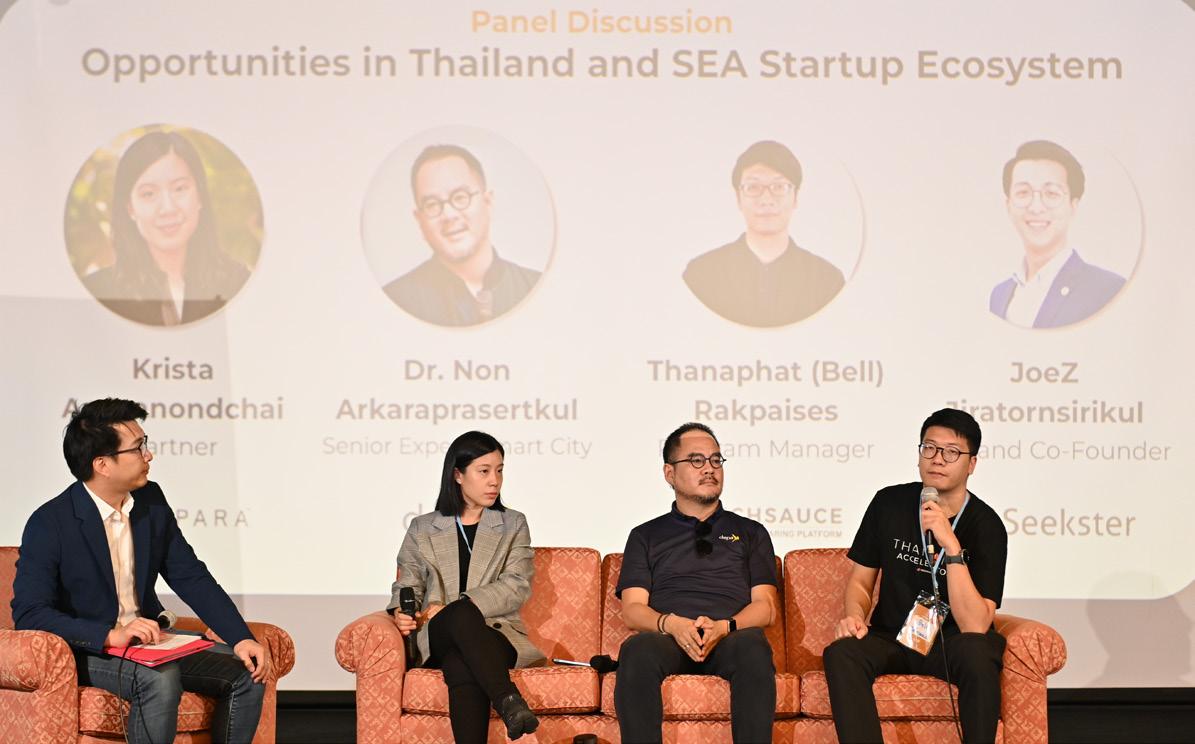
Day 2 of the boot camp featured an insightful panel discussion helmed by (from left to right) Mr Chatchanart Jiratornsirikul (JoeZ) CEO and Co-founder of SeekONE Holding; Ms Krista Arunanondchai, Partner at Expara; Dr Non Arkaraprasertkul, Senior Expert in Smart City, Digital Economy Promotion Agency; and Mr Thanaphat (Bell) Rakpaises, Programme Manager, Techsauce.
Participants engaged in an intensive Business Model Innovation workshop, delving into start-up ideas aiming to address the 17 United Nations Sustainable Development Goals and the importance of having Environmental, Social, and Governance goals in their start-up ideas.
The workshop saw compelling start-up ideas conceived from a good mix of participants, with their diverse backgrounds laying the foundation for a melting pot of innovative ideas with regional and global relevance.
The entrepreneurship boot camp culminated on Demo Day, where participants pitched their innovative start-up ideas to a panel of judges, industry experts, and fellow participants. The pitches showcased a spectrum of creative solutions, reflecting the diverse range of talents and perspectives brought together by the boot camp. Some winning ideas included Bridge, a platform that revolutionises career growth for musicians by ensuring fair compensation and transparency in gig management; an eco-friendly battery that uses a separable membrane made of sugarcane cellulose; and Studify, a platform that matches students with the right, credible tutors.
Participants also ventured beyond the classroom and embarked on learning journeys to True Digital Park and Amazon Thailand, gaining valuable first-hand insights from industry experts like Mr Casper Sermsuksan, the founder of SEA Bridge, a venture capital firm focusing on the Southeast Asian market. He shared that Thailand is leading in the global index for crypto ownership and online spending, noting that start-ups will need to align themselves with these trends so as to gain access to the Thai market which possesses great potential.
Mr Sermsuksan also pointed out the extremes in Thailand’s start-up funding where entrepreneurs must balance between seeking early seed funding and latestage corporate venture capital firms. To survive and thrive, he advised entrepreneurs to create products with a regional and global customer base in mind. This approach ensures scalability and attractiveness to investors at various stages of development, mitigating the early funding challenges faced by start-ups in the region.
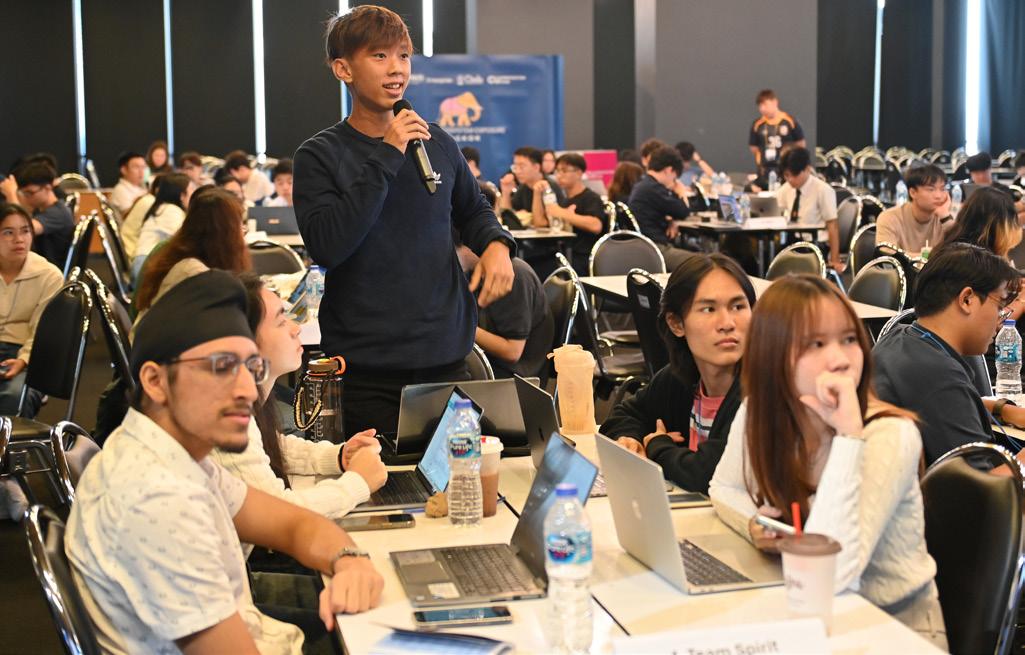

In the spirit of crosscultural learning, the boot camp also incorporated language and cultural exchange segments, encouraging participants to immerse themselves in the Thai language and understand the nuances of Thai culture.
As the NUS Enterprise Winter Programme in Entrepreneurship – Startup Ecosystem
Exposure in Bangkok wrapped up, participants not only gained a deep understanding of the city’s start-up trends and ecosystem but also forged enduring friendships with their peers. The boot camp celebrated diversity and fostered cross-cultural exchanges, emphasising the value of different perspectives in the entrepreneurial landscape.
Echoing the sentiments of fellow participants, Kumaravel Hema Kiruthika, a fourth-year student in Environmental Engineering at NUS

College of Design and Engineering, said, “Thailand is an amazing market, and their start-up ecosystem is truly fascinating and interesting to learn about. I’m grateful for the new friends whom I’ve met and the cultural experiences that I’ve gained.”
The journey of the participants was marked by collaborative efforts, shared learning experiences, and cultural immersion. Team-building activities, reminiscent of the camaraderie seen over the course of one week, laid the foundation for lasting connections. The programme facilitated an environment where diverse international backgrounds converged, echoing the sentiment that unity amid diversity is a cornerstone of success.
Rajanand Gambhir, a fourth-year student from the Chulalongkorn School of Integrated Innovation at Chulalongkorn University recounted, “This programme was all that I expected it to be, and more. It was great to connect and collaborate with numerous students from diverse backgrounds and network with startup business specialists.”
The boot camp was complemented with visits of Bangkok’s iconic gems such as the Wat Arun. Participants having a go at learning the Thai traditional dance.The first-ever Innovation x Impact Immersion Programme (I3P), jointly organised by NUS Enterprise Innovation with Societal Impact (ISI), NUS Social Impact Catalyst and Skilio, marked a dynamic journey for over 40 student entrepreneurs in Ho Chi Minh City. Held from 19 December to 23 December 2023, the programme offered participants the opportunity to explore Vietnam’s start-up ecosystem with a focus on building ventures that “profit with purpose”.
Diving into the country’s impact-driven entrepreneurship scene, I3P organised a series of engaging sessions with speakers including Taku Tanaka, Co-Founder of Kamereo, who shared insights into transforming food supply chains sustainably. Entrepreneur and YouTuber Kevin Nguyen of the Best Ever Food Review Show spoke about his personal journey as a chef and founder of several restaurants in Vietnam providing meaningful employment to youths entering the F&B industry. BLOCK71 Saigon highlighted its crucial role as an ecosystem builder, featuring perspectives from two impact start-ups, Viec.Co Corp and Solano Energy.

Vietnam Singapore Industrial Park 1 (VSIP1), a joint venture between Becamex and Sembawang Corporation.
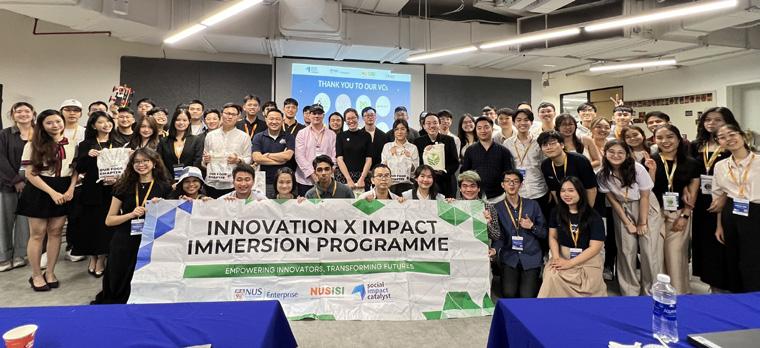
activity designed by the ISI team. Participants collaborated with students from IU-VNU to build product prototypes using Petit Blocks™ that address social problem statements. Each team was then tasked to film a TikTok video to market their product. Through the Make Market challenge, students displayed their creativity, while actively honing their skills in design thinking, marketing strategy, and teamwork – all essential elements for a start-up’s success.
With their entrepreneurial spark ignited, participants translated these insights into action as they pitched at the first ever Singapore-Vietnam Social Impact Catalyst Demo Day 2023 hosted at FUV. They shared the spotlight with their counterparts from FUV Social Impact Catalyst, as

Owing to NUS Enterprise’s partnership with Becamex IDC, participants also explored industrial developments in Binh Duong province, including the Vietnam Singapore Industrial Park 1 (VISP 1) and Eastern International University’s Advanced Manufacturing Centre.
Central to I3P is cross-cultural learning. Participants engaged with students from FPT University, Eastern International University, Fulbright University Vietnam (FUV), RMIT University Vietnam and International University – VNU HCMC (IN VNU). A highlight of the programme was the “Make and Market Challenge”, an
they presented their innovative ideas to a panel of venture capitalists. Over 20 start-ups and projects participated in the pitch, with SoundMind and Stick’Em emerging as co-champions. SoundMind promotes emotional wellness through songwriting, while Stick’Em offers affordable STEAM kits for children to develop soft skills through creative challenges.
Reflecting on their time in Vietnam, I3P participants expressed that the exposure has ignited in them a deeper passion for impact entrepreneurship. More importantly, they made new friends and connections, and gained an appreciation of the resources available to young founders, from NUS Enterprise and our network of partners.

Moaah’s AI Revolution in Transport and Customs Regulations for Supply Chain and Logistics Companies
Tapping into the usefulness of AI, Moaah aims to revolutionise the way companies navigate crossborder shipments and reduce the amount of misdeclared cargo shipments. Recent findings from NCB reveal that 55% of inspected containers harbour deficiencies in security, labelling, or declaration. With maritime transport accounting for approximately 80% of global trade, disparate shipping regulations pose a formidable challenge for companies to navigate. Moaah’s vision is to help all stakeholders including importers and exporters to have easy access to global customs’ regulations for improved accuracy in declarations and overall compliance.

Founded by a team of a lawyer and data scientists, the idea was first sparked by Yun Sil Chu, the co-founder of Moaah. Drawing from her experience in diverse law firms across Singapore, Yun Sil identified a glaring gap in companies’ understanding of shipping regulations, leading to recurrent clashes with customs authorities. Thus, Moaah, meaning “gathering” in Korean, materialised with the aspiration to amalgamate accessible information and data. Backed by four years of intensive research and bolstered by a team of 31 seasoned engineers and 158 customs trade data sources, Moaah aspires to be the go-to platform for cross-border shipment information, akin to the reliability of Google.
Misdeclared cargo can pose significant risks and the repercussions of misdeclaration, ranging from onboard fires to hefty penalties, underscore the imperative for stringent compliance. To reduce the likelihood of such incidents, shipping companies like Hapag-Lloyd have instituted a penalty of S$15,000 per box for misdeclared goods from China. Moreover, anti-trust rules in Europe and the US enforce a hefty fine of up to 10% of a company’s turnover, discouraging companies from noncompliance. With complicated and lengthy published forums containing up to thousand pages in PDFs or nondigitised regulations, it is difficult for companies to stay up to date.
This is where Moaah comes into the picture. Leveraging cuttingedge Natural Language Processing (NLP) and AI, Moaah synthesizes labyrinthine regulations into a userfriendly interface, transcending the barriers posed by voluminous PDFs and disparate forums. Yun Sil, mentions how committed the company is to their accuracy and timeliness, stating “We make sure that our regulations are updated by tapping into the actual customs authorities almost daily to weekly for each individual country and we make sure that they’re most up to date and we also cite their sources by looking into their government links or actual publication links available.” In the
I wanted to create something that is super easy, superefficient and fast for companies to cross check all the regulations before committing, packing and delivering their goods.
– YUN SIL CHUrealm of dangerous goods regulations where products are often listed solely by their commercial names, Moaah helps to highlight the actual chemical compounds such as the lithium batteries inside electronic goods. This proactive approach helps in minimising the risk of fines or accidents. Even with a million shipments in a month, Moaah’s unwavering vigilance in discerning hazardous cargo ensures adept risk management, safeguarding against potential fines and calamities
Moreover, Mooah’s dedication to innovate and excel in their field was recognised in 2020, when it secured a spot as a finalist in the Smart Port Challenge hosted by PIER71 and the Maritime and Port Authority of Singapore.
“What we have done over the past 5 years is consistently work with our first few customers that we’ve gotten onboard being, very transparent with what we can deliver and moving forward hiring more developers and engineers. Right now, we are searching for talents specialised in AI across the world so that they can help compliment and boost up our accuracy.” said Yun Sil. Moaah’s continuous dedication in improving their accuracy and interface solidifies their place as a trailblazer in the realm of cross-border logistics, setting new standards for efficiency and accuracy in the industry.

KosmodeHealth is a pioneering venture emerging from the NUS Food Science Technology programme. The start-up operates as what the founders describe as a “1-2-3 company”, one company impacting two sectors (in nutraceutical and 3D cell culture) with three technologies. The company was founded by Florence Leong and A/P Huang Dejian.
Considering herself a ‘reformed drug pusher,’ co-founder Florence Leong met her co-founder A/P Huang Dejian, while serving as an NUS Enterprise advisor. Bonded by a shared mission of expanding mass access to health from nature, they joined forces to translate A/P Huang’s technological findings into tangible market solutions. “I spent almost two decades at the big pharma and decided that I wanted to do something different.
“Most people think KosmodeHealth is a noodle company because our claim to fame is W0W noodle, the world’s first fully functional food with zero glycaemic response. But we are more than that, we are a business enabler. We leverage our expertise in extracting protein and fibre from waste streams and repurposing food processing by-products. Utilising these resources, we craft functional foods that serve as vital tools in the realm of health management, particularly in blood sugar control. At KosmodeHealth, we redefine food as medicine, empowering individuals to proactively manage their health.”
Discovering the start-up world through venture capitalism, I mentored various academic institutions, including ASTAR, NUS, and NTU. It was there that I met my co-founder and found that his ability to extract resources in a cost-effective, halal-certifiable manner would have huge impact in being able to make quality health material, affordable to the mass market. And after nurturing the idea for almost two years, KosmodeHealth was born.” said Florence.
At the heart of KosmodeHealth’s operations lies its cutting-edge plant extraction technology, revolutionising
the accessibility of authentic plant extracts at affordable rates. Embracing the ethos of a ‘zero waste’ economy, the company repurposes food processing by-products, such as spent barley grains post-brewery, into valuable sources of plant protein and fiber for human and cellular nutrition. Serving as a facilitator for businesses, KosmodeHealth empowers food, nutraceutical, and agricultural companies in innovating functional foods and supplements, while also assisting in the upcycling of plant food processing waste. Their most famous signature product is their W0W noodles, which is a zero waste, functional food made from protein and fibre upcycled from spent barley grains. Their W0W noodles reflect one of their core missions which is to address the nutritional needs of the Asian ageing and diabetic population.
– FLORENCE LEONG
Expanding their technological horizons, KosmodeHealth introduces Plant Protein Composite (PPCTM) bio ink, derived from recovered plant proteins, which can be 3D-printed into bespoke scaffolds for cell culture. This innovation not only mitigates the risks associated with animal protein use but also enhances the accessibility and affordability of cell culture applications. “Our ability to extract is beyond that of extracting protein fibre, we can also extract protein isolate. With protein isolates, we have a second technology which is to formulate plant protein composites, bio-ink. The bio-ink

can then be printed with 3D printing technology to customise the printing of scaffolds to meet the requirements of different types of cells. Essentially very much like ‘BTO-ing’, the scaffolds to create the environment which cells is happy to grow with,” said Florence. Incubated initially at The HANGAR and now at NUS Enterprise @ Singapore Science Park, the company’s PPCTM 3D Bioprinting facility stands as a testament to their achievements. This feat, including the development of the world’s only PPCTM Bio-ink & Bioscaffold, was made possible through grants from National Addictive Manufacturing Innovation Cluster and ESG Enterprise Singapore. “My experience with NUS Enterprise has been nothing short of fantastic. We got a grant to set up the 3D bio-printing facility when we had nowhere to set up our lab. We got the space to set up the 3D bio-printing. Not just the space alone, they have been fantastic in exposing, elevating our story, and giving us opportunities to showcase our products at events.” said Florence.
Offering advice to aspiring entepreneurs, Florence emphasised the importance of perseverance and belief in one’s vision over conventional academic metrics:
“My advice to the young ones is do not be defined by your academic qualifications, worse still don’t be defined by your grades. Humans have a capacity to learn and do things if we believe in it. The most important thing is to pursue what you believe in”.


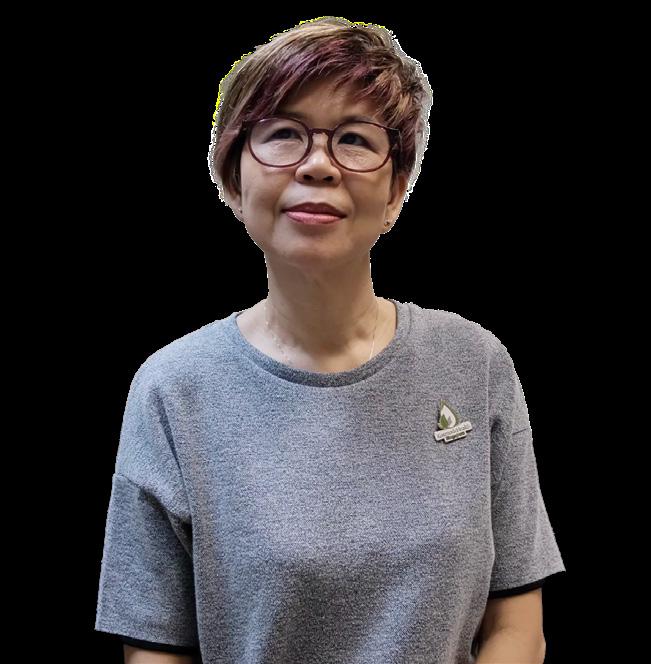

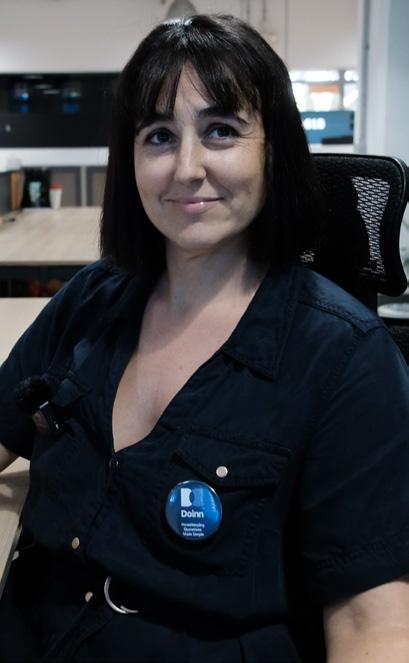
In pursuit of the perfect forever home for her family, a revelation ignited a spark within Noelia Novella, Co-founder, and CEO of DOINN. Having travelled often, she loved the experience of living among locals. Hence, short-term rentals were a common choice, “We decided to travel around the world to find out where we wanted our kids to grow up and we always used to stay in short-term rentals. We love the experience of living like a local. But at that time, my expectations as a traveller were the same that I used to have with hotels.” explained Noelia. She and her husband decided to talk to cleaning companies after their trip “We asked them what they needed in their technologies and platforms to be able to work for short-term rentals,” said Noelia.
This led to the founding of DOINN, which has come to benefit both rental owners and cleaning companies alike, coinciding with the rise of Airbnb usage and increasing interest in property management as an additional source of income. DOINN comes in as an all-in-one housekeeping operation platform for both property managers and cleaning companies. Started in 2014, by streamlining their cleaning progress from start to finish, this allows the cleaning companies or managers to prioritise property management tasks efficiently. The DOINN team compromises a group of passionate individuals known as “Doinners” a blend of dreamers and doers. A committed team of professionals that are dedicated in supporting clients, enhancing products and fostering community growth.
DOINN’s platform not only helps connect the relevant parties needed to ensure smooth management. They also offer analytical capabilities from accessing the quality of the cleaning to predicting next month’s schedule, serving as the perfect everyday tool.
DOINN’s platform significantly reduces the reliance of manual calculations and the need of multiple platforms needed to run a business. The platform seamlessly integrates various functions such as profit margin calculation, booking calendar management, checklist creation and personnel management. Consolidating all these essential aspects into a single efficient interface. As Noelia puts it, “They start selling more but doing less because DOINN becomes their sales team.”

This
DOINN’s platform provides analytical data in 5 categories: Operational, Financial, Performance, Logistics and Quality. Users can access data insights to enhance decision-making and optimise all aspects of their operations. From tracking service statistics by status, city, employee, and client to analysing financial metrics such as executed services and active properties. Their performance data allows users to compare the expected service durations with the actual timings. This enables users to address reported issues and notes for improved service delivery. Overall, DOINN’s platform empowers users to streamline operations, improve performance and ensure quality service delivery.
Operating across 6 countries DOINN has established their APAC Headquarters located in Singapore. With a customer base exceeding 250 satisfied clients, they continue to expand and provide outstanding service and support on a global scale. Noelia has shared that in the coming months, they will introduce a range of features focused on medium-term rentals catering to co-livings arrangements. This strategic move comes in response to the growing demand from prospective clients. Noelia emphasised that these upcoming features are designed to accommodate the unique needs of such clients, as they have the flexibility to choose the location of cleaning services based on their reservation details.
DOINN was headquartered in Portugal and looking to expand into Singapore. BLOCK71 served as a pivotal hub for their growth strategy in the APAC scene. As the operational centre for hospitality operators and cleaning and linen companies, DOINN is revolutionising the industry by empowering these essential service providers for an inclusive, sustainable, and digital future. With Block71’s ecosystem and support network, DOINN has leveraged the start-up community and strategic resources available in Singapore to accelerate its market penetration and enhance its offerings. Noelia shared that “these kinds of communities are super important” as “the mental health of entrepreneurs is a very specific and stressful role where you feel quite lonely, unless you’re in a community like BLOCK71 where there are other founders who are going through the same thing.” She emphasized the significance of the community from Block71 due to its ability to alleviate the isolation and stress commonly experienced by entrepreneurs.
In summary, DOINN’s journey from Portugal to Singapore highlights the spirit of innovation and collaboration within the start-up ecosystem. As they continue to innovate, empower, and inspire, DOINN stands to redefine the standards of excellence in the hospitality industry, one cleaning service at a time.
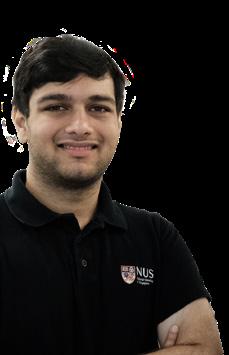
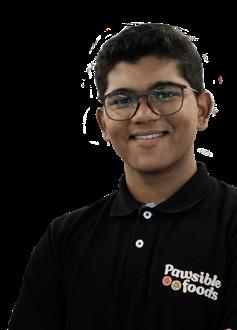
are both second year undergraduate students at NUS. Samyak is majoring in Economics and Armaan is majoring in Chemical Engineering, both share a second major in Innovation and Design.

In today’s conscientious market, pet owners are increasingly vigilant about their pets’ dietary requirements. In regions with high pet ownership rates, there’s a growing demand for quality pet nutrition that goes beyond standard commercial offerings, often criticized for their inferior ingredients and reliance on unnecessary additives. Addressing this need, Armaan Dhanda and Samyak Baid launched Pawsible Foods, aiming to revolutionize pet nutrition through advanced fermentation techniques.
“ We observed a significant shortfall in pet food quality. Our mission is to elevate pet nutrition standards through innovative fermentation processes,
– SAMYAK BAID
For every kilogram of mushroom that is produced, there is over five and a half kilogram of nutritious stems and spent mushroom substrate that goes to waste. At the heart of Passible Foods’ innovation is the transformation of underutilised side streams into nutrient-rich mycoprotein. This initiative harnesses the potential of mycoprotein, derived from fungal fermentation, to create nutritionally rich, sustainable pet food protein alternatives. Unlike traditional sources, mycoprotein offers a lower environmental footprint and aligns with the founders’ vision for a circular economy. By utilising unspent mushrooms, they use their innovative fermentation techniques to create Myco-ingredients™. Their technology allows them to extract potent, nutritionally rich compounds and transform them into a form that is digestible and delicious for dogs. “Our micro-ingredients, derived from mushroom stems, form the heart of our first CPG (Consumer Packaged Goods) product, the Core Wellbeing Nutritional Topper. The micro-ingredients contribute to the taste and palatability of our products, while other plant-based superfoods contribute to their micro-nutrition. The topper is a unique blend of over 10 organic superfoods but also includes a rich blend of proteins, grains, seeds and aromatic spices.” said Armaan.
Mycoprotein, a high-quality protein derived from fungi, represents a sustainable and nutritionally rich alternative to traditional pet food ingredients. Produced through sophisticated fermentation processes, mycoprotein utilizes agricultural by-products as its substrate, thereby embodying the principles of circular economy and minimizing environmental impact. This innovative approach
not only addresses the urgent need for sustainable ingredient sources but also ensures a high level of nutritional content, making it an ideal component for pet food manufacturers aiming to elevate their product quality.
“Our mycoprotein-based products, developed from fermented biomass, serve as the cornerstone of our brand, offering a blend of high-quality protein and essential nutrients tailored for pets,”
This approach not only reduces waste but also contributes to a more sustainable pet food ecosystem by converting underutilized organic materials into valuable pet nutrition. As Pawsible sets its sights on India, they recognise the diverse needs of dogs in this dynamic market. Nutritional toppers are particularly beneficial for dogs in India, where the climate, lifestyle and diet may differ from other regions. Tailoring their offerings to suit the specific climate, lifestyle and dietary preferences prevalent in the region, they aim to make a meaningful impact. Their nutritional toppers are also beneficial for dog owners that feed their dogs home-cooked food as home-cooked food may lack certain nutrients essential for their dog’s health.
Reflecting on their journey, Armaan shared the encounter that sparked their collaboration. “The origin story of Pawsible is very interesting; Samyak and I met during orientation week during our first year of university and we just clicked. Samyak was working on his own idea, and I was wanting to start up in the mycelium or protein space. And we figured out that pet food is a problem to solve,” said Armaan.
Grateful for the support of NUS
Enterprise, they also spoke about the support their received in their early beginnings. “Pawsible Foods would not exist without NUS Enterprise, very interestingly, Enterprise gave us our first check ever under the VIP Impact Grant, about $10,000. That acted as a stepping stone to future grants and increasingly, we were awarded by DPM Lawrence Wong, which was a very brilliant moment for us,” said Armaan. The duo started Pawsible in 2022 and is currently incubating at The HANGAR, NUS Enterprise’s on-campus base for NUS start-ups and entrepreneurs.
“HANGAR is like our home on campus, it’s where all our ideas take flight and overall carrying the NUS brand and Enterprise brand abroad or even in other places in Singapore gives us instant credibility. Credibility that any startup doesn’t get that instantly.” said Samyak.
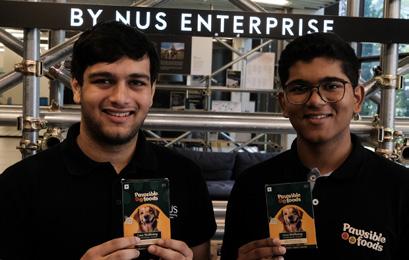
Pawsible Foods is continuing to be at the forefront of innovation in pet nutrition. Through their utilisation of fermentation and repurposing of mushroom stems, Armaan and Samyak have addressed a significant gap in the market while promoting sustainability. Their commitment to canine wellness and adaptability to global market needs reflect their pragmatic approach. As they expand their influence, Pawsible Foods epitomises the potential of creative solutions to enhance the lives of pets worldwide.

Nobody likes using a dirty toilet, let alone cleaning one. Hivebotics aims to aid cleaners in keeping public toilets clean with the help of their autonomous robot. There is a shortage of cleaning staff in Singapore, there’s no debate that cleaning toilets is probably the least glamorous aspect of cleaning even when you’re cleaning your own home. Equipped with sensors providing a 3D view, the robot is able to effectively identify stains and areas in need of cleaning. They come equipped with brush, steam and dry functions to clean urinals, toilet bowls, mirrors and sinks. This innovation not only helps to maintain the toilets clean but also significantly reduces the workload for cleaners who often face challenges due to the physically demanding nature of the job.

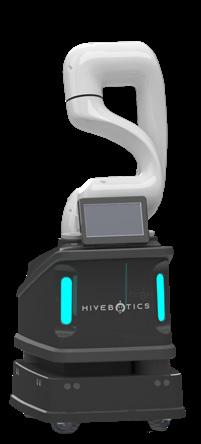
By embracing innovative ideas, these start-ups are using their cutting-edge technology to tackle real-world challenges head on. Spanning from education, healthcare and manual labour, they are driven by the shared motivation to instil positive change through their groundbreaking solutions.
Ever wondered about the amount of carbon being captured? NuSpace’s IoT constellation facilitates easy data collection from sensors on trees, offering insights into forest health and ecosystem well-being to combat climate change. NuSpace offers a range of satellite services from designing satellite missions from ground up building entire satellites. Their services extend beyond traditional satellite applications, with a focus on customising solutions that can address their client’s unique needs. That’s not all NuSpace has to offer, their IoT constellation allows for monitoring of crop health and livestock behaviour, optimising farm operations. Additionally, any hikers looking to hike in the Southeast Asian area can rely on NuSpace for safety. Their device requires periodic safety confirmation from hikers if not SOS alerts are sent to the network and hikers emergency contact. Which ensures swift action taken in the event of an emergency. Their technology ensures convenient, reliable data collection that can be easily analysed, making access to space simple.
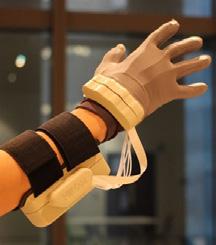
Interact AI revolutionises education and training across multiple sectors by offering virtual AI humans. These digital assistants enhance the learning experience and support in healthcare, education, customer service, retail, e-commerce, mental wellness and HR. With their interface, you can create any scenarios needed to help you better understand how to provide personalised assistance and guidance. Interact AI also addresses the areas for improvements, offering learners actionable insights to improve their communication skills. Hence, making education and training more effective and engaging across all industries.
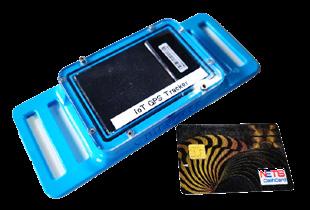
Microtube Technologies has unveiled their latest gadget, the HEXR Glove, an untethered pneumatic extended reality haptic glove. It is built for immersive experiences and helps to empower users to feel and sense digital objects on their fingertips without the usual bulky accessories seen from other gadgets with similar functions. This gadget can be used in various industries like healthcare, education, aviation and gaming. Furthermore, with the help of Microtube Technologies program, the IV Nimble, SGH nurses can undergo gamified training that can simulate realistic cannula procedures. This can help build confidence in learning the procedure, showcasing the potential of immersive technology in improving patient care. Cannulation can be a scary and stressful procedure for patients to go through, by having more in-depth training healthcare professionals will be more equipped in handling these patients.
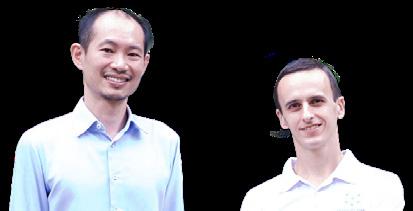

Mesh Bio has raised $3.5 million in Series A financing led by East Ventures, with participation from Elev8, Seed Capitals, and other investors. Mesh Bio utilises predictive analytics to revolutionise chronic disease management, particularly in Southeast Asia, including Indonesia, the Philippines, and Hong Kong. With recent regulatory approvals and implementation pilots in Singapore, such as HealthVector Diabetes, the funding will support the expansion of its digital twin technologies across the region.
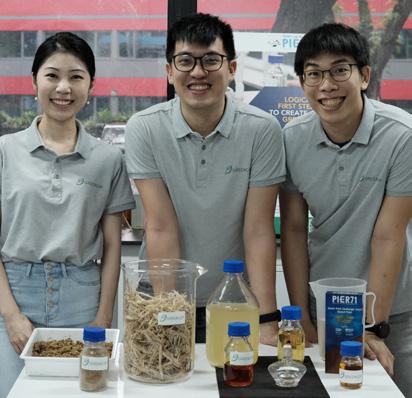
Green COP has successfully closed its angel investment round, attracting support from various angel investors, including Ken Energy and Teo Teng Seng. Teo, a veteran in the maritime industry, is set to become the start-up’s chairman. Green COP’s proprietary biofuel production method has also garnered interest from a global palm oil company, indicating potential for wider adoption of sustainable practices.
Sleek EV, a Thailandbased electric two-wheeler brand, has concluded its pre-Series A extension round with Finnoventure Fund, managed by Krungsri Finnovate. Led by cofounders Ben Tun and Ong Zhang Quan, NOC
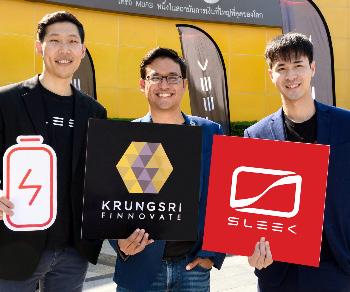

New York Alumni, the funding will be allocated for R&D, production expansion, hiring, and raw material sourcing. Sleek EV focuses on providing a seamless user experience through proprietary software and hardware, including IoT-enabled batteries and mobile app features. The start-up aims to cater to regional markets with its four models and has sold over 1,000 units in 2024.
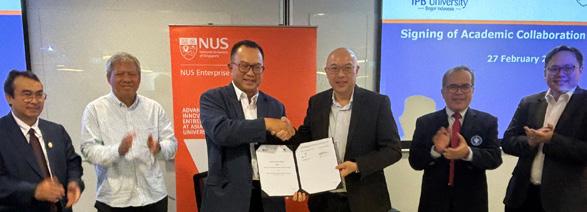
The National University of Singapore and IPB University signed a Memorandum of Agreement (MOA) on 27 February 2024, to foster innovation and entrepreneurship between the two universities. The MoA was signed by Professor Chee Yeow Meng, NUS Vice President (Innovation and Enterprise) and Professor Dr Arif Satria, IPB University Rector. The collaboration enables Indonesian students to delve into entrepreneurship through scholarships for the NUS Master of Science in Venture Creation programme. It also provides opportunities for students from both countries to network and collaborate while gaining insights into the entrepreneurship ecosystems of Indonesia and Singapore. This initiative is aligned with NUS Enterprise’s ongoing efforts to promote entrepreneurship through partnerships with ASEAN universities.
To recap past NUS Enterprise events and stay apprised of those upcoming, please refer to the following QR code.

Green with envy might come into mind when people are asked about how they feel towards influencers. Amid the surge in TikTok’s popularity during the COVID-19 lockdowns, a new wave of influencers rose, drawing both admiration and scrutiny. Despite their growing numbers and strong impact, influencers frequently face misconceptions that label them as lazy or undeserving of their success, particularly when compared to traditional celebrities like actors or musicians. Interestingly, there is a shift occurring when influencers transition into becoming brand owners, a move that often commands more respect. Let us delve into why many influencers choose to venture into entrepreneurship and how owning a business alters perceptions about their work ethic and reputation.
The path to influencer stardom often originates from diverse content formats such as short and entertaining skits, relatable vlogs, or makeup tutorials, among others. However, the pivotal factors in an influencer’s rise to fame is largely dependent on two main aspects: the algorithm of the social media platforms and the perception from their fan base. This dynamic can lead to a challenging paradox where fan admiration can sour if the influencer undergoes drastic changes attributed to newfound fame. As an influencer’s popularity grows, change in behaviour, content, or attitude might create a rift with their audience, diminishing the initial relatability or authenticity that initially garnered followers. Moreover, with increased brand deals and opportunities, influencers sometimes face backlash when



airing grievances, as fans perceive such complaints as a lack of awareness about the privilege of earning a living through such opportunities. The flaunting of the soughtafter influencer lifestyle also encourages more people to emulate their path. This complex relationship often places influencers in a delicate balance between staying true to themselves whilst meeting the expectations of an evolving audience, where any deviation can lead to a significant shift in public perception.
Influencer marketing has undeniably emerged as a prominent trend, and its growth reflects its significance. According to Oberlo, the influencer marketing industry surged to a value of $21.1 billion in 2023, marking a substantial 28.7% increase from the previous year. Besides expanding their streams of income, influencers also recognise the need to foster genuine connections with their audience. Fans have a discerning eye, capable of distinguishing between a mere cash-grab and a genuine business effort. Their decision to support an influencer’s venture hinges on the perceived authenticity and passion embedded in the products or services. For influencers aiming to expand their business and audience base, conveying sincerity and a true passion for their creations becomes paramount.
It is easy to see this with influencer, Emma Chamberlain’s fanbase after she dropped out of high school to move to LA to pursue content creation. She garnered 8 million subscribers over the course of two years by the time she hit 18 because of her relatable personality and lifestyle as a teen in a small town. As her following grew, fans started noticing a shift in her personality and found it hard to relate hard to her struggles or lifestyle anymore. In talking to her fans about her struggles and being honest with them about her struggles, she started to come across as entitled, as many of her fans would like to be in her position. However, one thing she stayed consistent through the years was her love for coffee. Hence, her starting Chamberlain Coffee was a huge success, resonating with the brand identity and having a clear passion for her products.
She sells her coffee blends alongside another product, the iconic mason jars in which she is known to drink from in her videos.
Rather than being perceived as just another influencer, this move for her has set her apart from the rest and provided her more credibility and respect as a career woman. Hence, fans have become increasingly open-minded towards any project that Emma undertakes, including collaborations with Louis Vuitton and her role as the host of the Met Gala.
Examining Jaclyn Hill’s journey, she gained prominence in the beauty community in 2010 with her personable glam makeup tutorials on YouTube. As time went on, she collaborated with big brands like Becca cosmetics and Allure but most notably with Morphe for the launch of her “Jaclyn Hill palette”. Her palette was well received by not only her fan base, but all makeup enthusiasts at large. With many successful collaborations under her belt, she eventually started her own makeup line, Jaclyn beauty, in 2019.

This is when things took an unfortunate turn as her lipsticks were found to contain weird grains, unknown fibres, small bumps and holes. Furthermore, some fans even experienced allergic reactions, intensifying the concerns about the quality of the product. Fans weren’t the only ones speaking out about this, influencers who had received PR packages or did reviews on her product also came out to say the products were not clean and appeared expired.
Her initial silence during the peak of the controversy sparked even more debate and frustration from fans. They were demanding not just explanations but full refunds as fans felt like as a business owner it was her responsibility to address the issues. Her 14-minute-long video addressing the concerns were perceived as excuses rather than providing genuine care and customer service to their experiences.

In 2021, Jaclyn Roxanne was announced as her new jewellery line, independent of partners or investors. Fans were hyped over this passion project, expecting a difference from her cosmetic lines as she would have full control of the brand. However, despite the high price point, fans noticed missing clasps from earrings and the jewellery caused skin discoloration, contrary to Jaclyn’s claims. The
customer service was also not at the standard that was promised, with fans struggling to address issues with broken items.
trademark the name hence allowing Jacilyn to use and trademark it. Fans felt it was unjust for Jacilyn to do so, especially when she was aware of the existing brand and still went ahead with launching her products. Her addressing the controversy was 2 minutes long, leading to fans feeling like it was ingenuine.
Overall, fan’s felt disheartened, noting a pattern in Jacilyn’s behaviour. She seemed to only start posting YouTube videos when launching or promoting a new product. This led fans to believe that her actions were insincere and driven solely by profit.
In conclusion, the comparison between Emma Chamberlain and Jacilyn Hill’s business ventures sheds light on the evolving landscape of creators transitioning into business ownership. Authenticity not only fosters trust but also establishes a unique and loyal customer base just like any other brands would strive to do.

In 2022, she released Koze Apparel, a clothing line specifically for autumn. The announcement stirred dissatisfaction among individuals, who alleged that she had appropriated the name from Kalyn’s Coffee, a business established by the Australian YouTuber, Kalyn Nicholson, who is also the founder of All Things Koze, launched in 2017. As a smaller creator and business owner, Kalyn lacked the funds to
As the trend of creators-turnedentrepreneurs continues, it is crucial for these creators to approach brand ownership with transparency, integrity, and a deep understanding of their audience’s expectations. A successful creator turned brand owner not only provides valuable products but also nurtures a community that extends beyond their initial online presence.

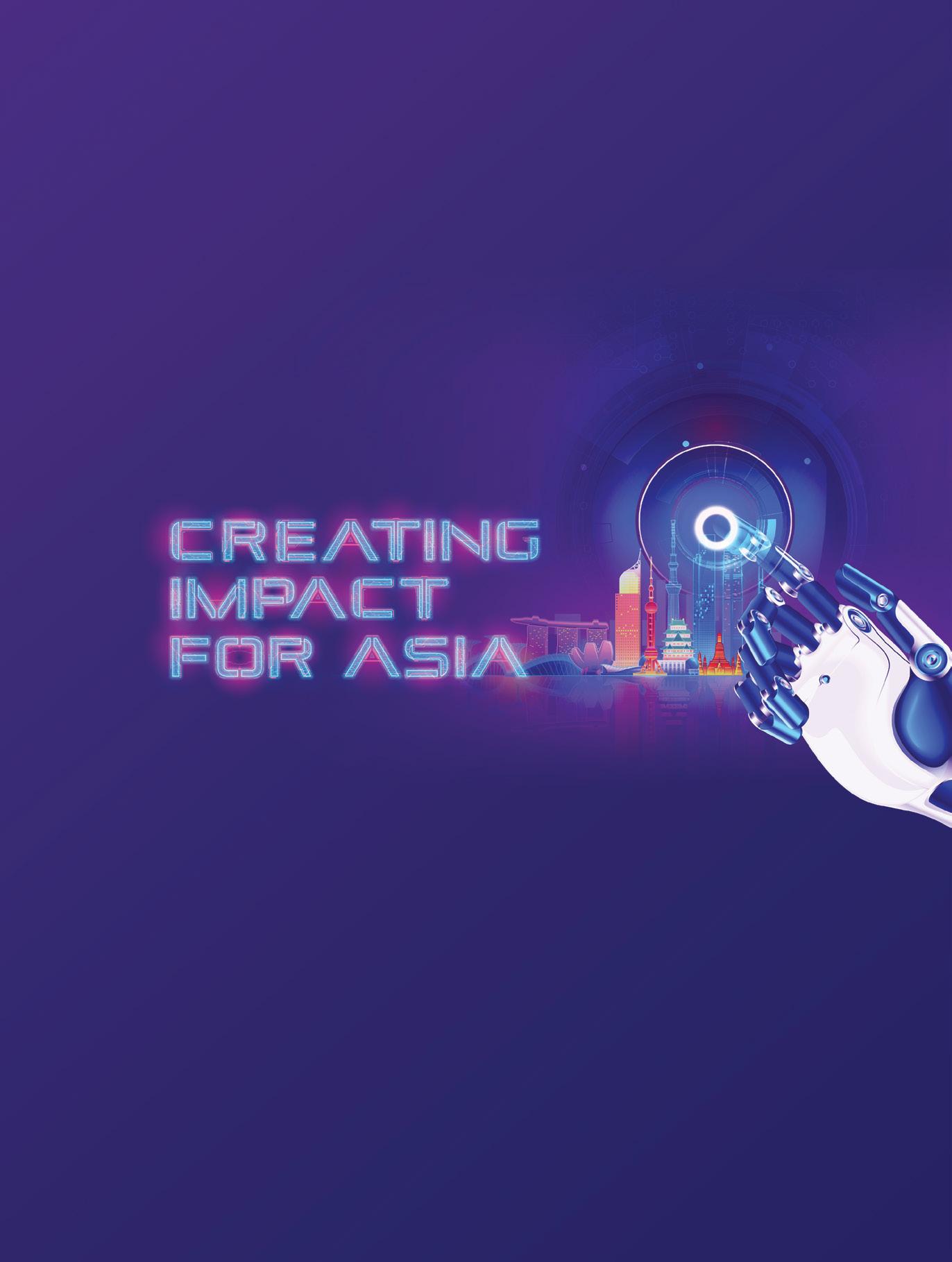

BROUGHT TO YOU BY IN PARTNERSHIP WITH HELD IN SUPPORTED BY